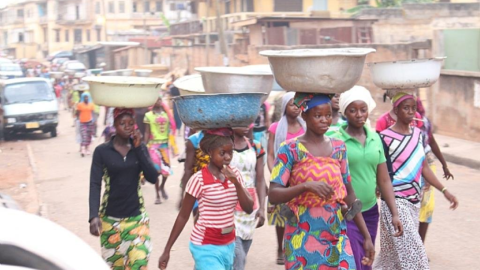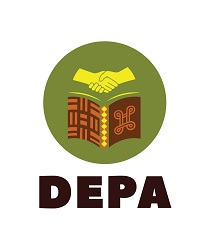
Introduction
On June 12, the World Day Against Child Labour, we spotlight the often-invisible struggles and plight of millions of children globally who are ensnared in exploitative labour practices. This day calls for a critical re-evaluation of global labour practices and the hidden injustices that many, particularly in developing nations endure. The plight of the Kayayei (head porters) women in Accra, Ghana, serves as a compelling case study of the complex interplay of economic exploitation and gender-based violence, including the systemic abuses and institutional neglect that is intricately linked to child labour. Community leaders and local gangs often abuse and sexually assault these vulnerable women and based on their privileged position intimidate or silence their victims in crafty cover-up schemes. This not only sustains the cycle of exploitation but also obscures the true extent of child labour abuses within these communities. This post, drawing from the fieldwork research for my PhD aims to spotlight the multiple dimensions of marginalisation that these young women face, including the need for a more culturally sensitive and sustainable approach to addressing child labour, one that considers multiple axes of identity and disadvantage.
The Kayayei's task seems simple: they carry loads, including bales of second-hand clothes, yam tubers, or other market produce, across the busy marketplaces of Ghanaian towns. The women who work as Kayayei play a crucial role in the country’s economy as they transport these goods through the markets. Given the crowded, overflowing informal markets that cater to the majority of households in Ghana, head carrying is often the only way to get goods from importers' trucks to retailers in the market and from retailers in the market to consumers’ vehicles or homes. In this way, the women who work as Kayayei (singular Kayayo) are key drivers of Ghana’s economic engine. However, the job of the young women and girls who work as Kayayei is not a desirable one. At best, it is undignified, dangerous, deadly, exploitative, and poorly paid.
The Kayayei Phenomenon
The Kayayei in Accra, Ghana, represent a profoundly marginalised group whose labour is nonetheless vital to the city's economy. Despite their essential role in moving goods through Ghana’s bustling markets, the realities of their lives are often romanticised or overlooked, masking the brutal conditions under which they labour. These women and girls, some as young as eleven years old, are mainly migrants from rural communities in northern Ghana, who travel to south in search of better living conditions. Their migration is not merely a quest for better opportunities but a stark reflection of deep-rooted socioeconomic disparities in their home communities. Compared to the south, northern Ghana has historically faced developmental neglect, low investment in infrastructure, education, and healthcare. This disparity has not only limited local employment opportunities in the north, but also perpetuated a cycle of poverty that forces many women and girls to migrate southward in hopes of a better life. However, the harsh reality that meets these Kayayei in Accra starkly contrasts with their aspirations. They often soon find themselves in precarious socio-economic positions that make them vulnerable to various forms of abuse both at work and in their living environments.
As Kayayei, these women and girls sometimes carry more than their full body weight on their heads for over a kilometre for less than the £1.00 equivalent per trip. These lead to chronic injuries such as spinal compression, neck fractures, damage to skeletal structures, cartilage deterioration, and deaths. Most Kayayei are also teenage mothers who bring their babies to work wrapped on their backs, exposing them equally to several tragic incidents. In 2005, a baby was tragically killed when a heavy load slipped backwards off her mother's head, crushing her baby to death. This precarious working condition is further compounded by the spectre of robbery, sexual violence, abuses, and rape that these women and girls endure after work in their living environments.
A significant number of Kayayei in Accra reside in Old Fadama, where they endure extremely poor living conditions. Often ten or more of these women and girls share a room smaller than five square meters without windows for ventilation, potable water, toilets, nor showers. Despite these inconveniences, such accommodations are also in very short supply, leading many to sleep outdoors in lorry stations and at market squares, and risking suffocation by wrapping themselves in plastic bags to prevent mosquito bites.
Sleeping in these open spaces further exposes these women to multiple incidents of robberies, sexual violence, and assaults, including rape cases that result in unplanned pregnancies, unsafe abortions and the death of multiple women and children. These abuses are not merely isolated incidents but part of a broader pattern of gender-based violence prevalent across the Kayayei communities. Rarely are perpetrators held to account as the systemic nature of the abuses is compounded by cover-ups orchestrated by authorities, unequal power dynamics, and powerful community leaders who exploit their positions of authority and influence to hide their culpability in these acts. Farmer's concept of ‘structural violence’ explains how social structures and institutions systematically harm marginalised individuals, providing a theoretical framework for why rape and sexual violence cases like the experiences of these migrant women are often dismissed, covered up, or ignored by local authorities (Farmer, 2004).
Strategic Approach to Empowering Kayayei: Education, Legal Rights, and Healthcare
Addressing this challenge requires a nuanced, three-staged strategy compassing educational and economic empowerment, the protection of legal rights, and enhanced access to healthcare services. In Ghana, legislative frameworks such as the Free Compulsory Basic Education Programme (FCUBE), introduced in 1996, mandate schooling for every child of school age. Despite these provisions, the persistent involvement of school-aged children in the Kayayei trade contravenes this law, entrenching them in a cycle of exploitation. Rigorous enforcement of this legislation is necessary to safeguard the educational rights of these children. Educational initiatives must also transcend basic literacy to include vocational training programmes designed to reflect the unique socio-economic realities of the Kayayei. Such programmes should aim to cultivate skills in trades and crafts that are not only culturally pertinent but also economically viable, thereby enhancing their employability and potential for generating income. This approach promises not only to broaden their skill sets but also to improve their socio-economic status through the creation of sustainable employment opportunities.
The enhancement of skill development initiatives for Kayayei women and girls must be integrally linked with the advancement of legal advocacy efforts and the safeguarding of their rights to prevent exploitation. It is crucial to bolster the robustness of legal frameworks and simultaneously ensure the rigorous enforcement of existing statutes to effectively mitigate the exploitation of the Kayayei. This can take form of establishing legal aid clinics and the design of targeted advocacy campaigns aimed at educating Kayayei about their legal rights to equip them with the necessary tools and support to navigate the complexities of the legal system effectively.
Furthermore, health advocacy must be prioritised to address the wellness needs of the Kayayei. This should comprise interventions targeted at both the physical injuries resulting from their labour-intensive roles and the psychological trauma stemming from exploitation and abuse. Accessible health services tailored to the specific needs of the Kayayei are essential, incorporating reproductive health care, mental health support, and occupational health services to significantly enhance their quality of life. Improvement the working conditions of Kayayei is equally important. There is a pressing need to expand upon labour standard laws to provide better protection for Kayayei and others within the wider informal sector. Such legal amendments should aim to safeguard these workers from the harsh realities of physical labour, thereby ensuring a safer and more equitable working environment.
Conclusion
As we mark the World Day Against Child Labour, it becomes imperative to recommit to the struggle against the systemic injustices endured by the Kayayei of Accra. The plight of these young women and girls, deeply entwined with the broader dynamics of socioeconomic disparities, calls for a multi-faceted approach that bridges education, legal advocacy, and healthcare. Our collective responsibility goes beyond mere recognition of their hardships to actively challenge the structures that perpetuate their exploitation. By strengthening educational opportunities, rigorously enforcing legal protections, and improving access to comprehensive healthcare, we can begin to alter the harsh realities faced by the Kayayei. Every effort counts in our journey towards creating a world where the dignity and rights of every child are upheld, and the shadows cast by child labour be finally lifted. Let this day serve as a reminder of the urgency with which we must act to ensure a brighter, more equitable future for all.

